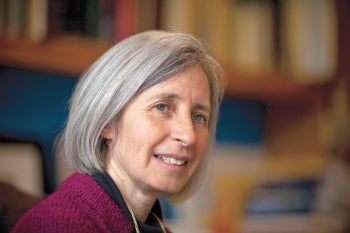“In theory there is no difference between theory and practice. In practice, there is.” So, we think, said Yogi Berra. He also supposedly said, “How can you hit and think at the same time?” At law school, we daily acknowledge the differences between theory and practice—and between thinking and doing—while also working constantly to bridge the two. In the creative tension between theory and practice lies our comparative advantage. So this September—10 years after the 9/11 attacks—we launched a new initiative pairing the academic research of Harvard Law School professors with the policy expertise of the Brookings Institution to tackle challenging issues of national and international security. Headed by HLS Professor Gabriella Blum LL.M. ’01 S.J.D. ’03 and Benjamin Wittes, a senior fellow in governance studies at Brookings, the Harvard Law School-Brookings Project on Law and Security directs legal scholarship to vexing and persistent questions of policy while infusing real-world realities into academic discussions. The project includes Professor Jack Goldsmith, who co-founded the national security blog Lawfare with Wittes and Robert Chesney ’97, and also many of our students.
Members of our corporate law faculty, consistently recognized around the world for their innovative and influential scholarship, also bring perspectives of practitioners, case studies of business strategies, real-time analyses of contemporary deals, and in-depth studies of business transactions to their classrooms. This issue highlights some of these efforts and also explores burgeoning clinical opportunities for students interested in business law and business regulation.
Another story here follows our faculty member Gerry Neuman ’80 to Geneva, where he brings his knowledge and research to his new role as one of 18 elected members of the United Nations’ Human Rights Committee, the expert body created by and charged with enforcing the International Covenant on Civil and Political Rights. Selected as an internationally renowned master in the field, Professor Neuman is already bringing back to Cambridge rich insights from his immersion in reports by member states and petitions by individuals.
Further cross-pollinating practice and theory, this year we have launched a multiyear training program for associates of the Milbank law firm. In turn, we will use this effort to explore the demands and opportunities in the changing marketplace for lawyers as we pilot new teaching materials and examine career paths and changing modes of delivering legal services.
Every day at the school, accomplished alumni who have pursued vital careers in law practice, business, politics, nonprofit leadership, and other fields generously share their time and insights, advising students, faculty and this dean. I am delighted that the Bulletin has profiled several outstanding alumni: former Solicitor General Paul Clement ’92, private equity investor Tope Lawani ’95, and financial expert and successful Broadway producer Roy Furman ’63, among others. More than 700 alumni attended the joyful 3rd Celebration of Black Alumni. This issue shares insights from Peggy Cooper Davis ’68, John Payton ’77, Loretta Lynch ’84, Timothy Wilkins ’93 and Darin Johnson ’00, who exemplify the remarkable and diverse careers of black alumni graduating from HLS over the past five decades.
Students find opportunities to reflect on their clinical and summer work experiences while also generating research that in turn assists practice. A story inside recounts how Ryan Park ’10 learned that Judge Richard Posner ’62 of the U.S. Court of Appeals for the 7th Circuit cited an article he wrote as a student.
We mourn the loss of a colleague and friend, Professor Bernie Wolfman, whose career connected theory and practice in tax law and civil rights, and whose memorable teaching and prolific writing informed generations of law students and lawyers. We also remember here Professor Derrick Bell, a former HLS faculty member and the school’s first African-American tenured professor. His pivotal and courageous work spanned the front lines of the civil rights movement, imaginative writing, outspoken protest and searing critique in pursuit of equality.
Sparks fly when theory and practice meet. Daily work lifts with aspirations while lived experiences discipline ideals. As Yogi Berra apparently said, “If the world was perfect, it wouldn’t be.”
